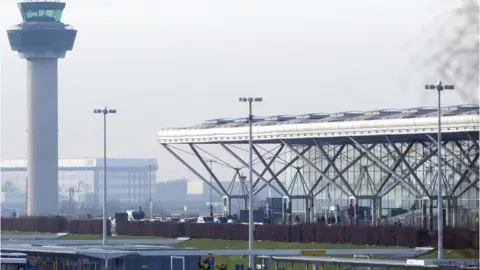Stansted planes too close and safety 'much reduced'
 Press Association
Press AssociationSafety was "much reduced" when a passenger jet came too close to another plane near Stansted Airport, a report said.
An Airbus A320 had to pull out of attempting to land as a smaller Saab 340 was preparing for take off, an Airprox Board report said.
When both were in the air they came within the recommended distances of each other on 12 February 2019.
There were ineffective elements on the ground and in the air, the report said.
Air traffic controller actions did not resolve the conflict, while the Stansted Aerodrome Traffic Monitor (ATM) was ineffective, the report said.
It added there had been a "breakdown" in crew resource management in the A320 which had distracted them and meant they did not comply with an order to turn left in a "timely manner".
An airprox was recorded when the A320 was at an altitude of 3,000ft and the Saab was at 2,400ft.
The craft came within 87m (285ft) of each other horizontally - nearer than the minimum recommended of 4.8km (3 miles) horizontally and 305m (1,000ft) vertically.
'Learn lessons'
The Airbus had gone around once before successfully landing.
The report said: "It appeared that the Air Traffic Control team had controlled in the expectation of compliance, not in the light of what was actually transpiring."
One possible cause for distraction in the Airbus was that the commander was training and his performance being monitored, the report said.
The report said this may have led to him allowing an "excess energy" situation to persist for longer than he normally would have.
Air navigation service provider NATS said the incident was not caused by that, but a thorough investigation had been conducted "in order to learn any possible lessons".
A spokeswoman said: "The air traffic control units involved have addressed the issues raised as a result of an internal investigation led by NATS and the report made by the Airprox Board."
